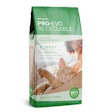
The U.S. Food and Drug Administration announced that grease-proofing materials containing certain per- and polyfluoroalkyl substances (PFAS) are no longer being sold for use in food packaging in the U.S., including pet food bags.
Manufacturers use thousands of PFAS, in products ranging from pet food bags to ammunition, climbing ropes, guitar strings and artificial turf. On pet food bags, PFAS can help the bags resist moisture and lipids, such as fats and oils. PFAS are also used in the production process of some pet food containers.
Along with their ubiquity, the problem arises from how slowly PFAS break down in the environment and in animals’ bodies. People and animals absorb PFAS, and the chemicals remain in their bodies for many years, if not life. Scientists have identified health risks from some PFAS, although not necessarily those used on pet food packages. Those risks included increased testicular and kidney cancer risk and infertility.
In November 2022, the Environmental Working Group published a report stating that a laboratory working for the group had identified PFAS on 11 packages from seven pet food brands, but not in the pet foods themselves.
FDA evaluation of PFAS use
Adapted from a press release:
Currently, the FDA has authorized certain PFAS for limited use in cookware, food packaging and food processing equipment. FDA’s announcement marks the fulfillment of a voluntary commitment by manufacturers to not sell food contact substances containing certain PFAS intended for use as grease-proofing agents in the U.S.
In 2020, the FDA engaged companies to cease sales of grease-proofing substances that contain certain types of PFAS following the agency’s post-market safety assessment. The research FDA scientists conducted and published played a part in helping the agency obtain commitments from manufacturers to voluntarily phase out the use of these substances containing PFAS in paper and paperboard food packaging products.

















